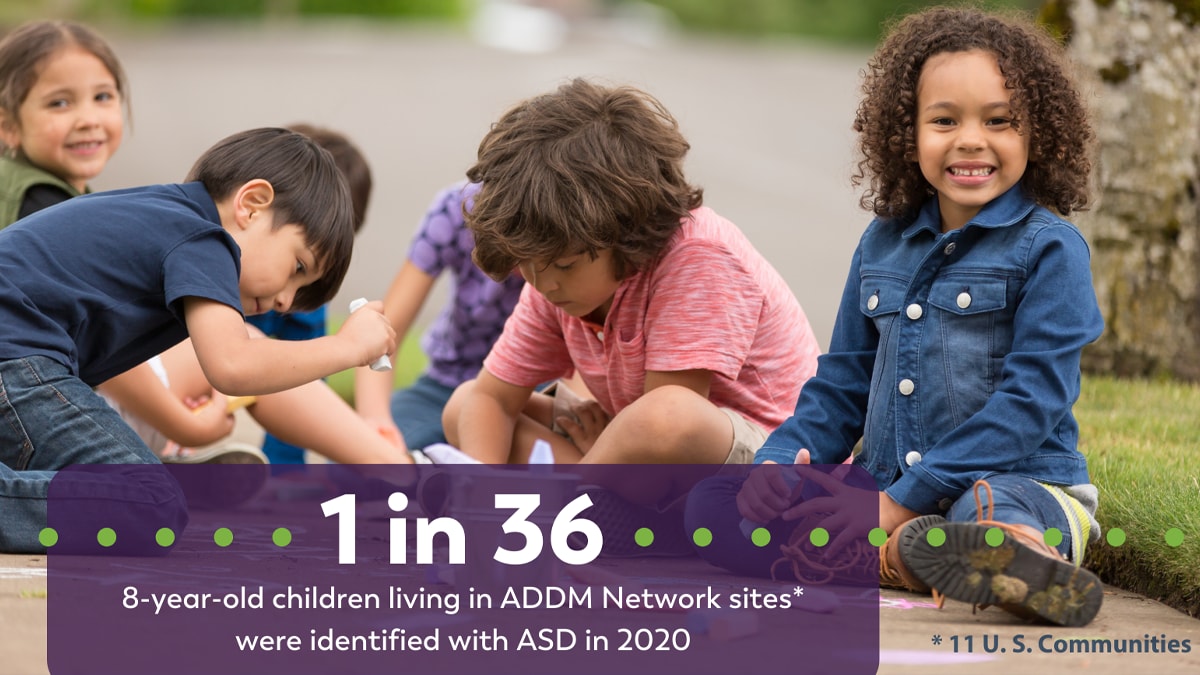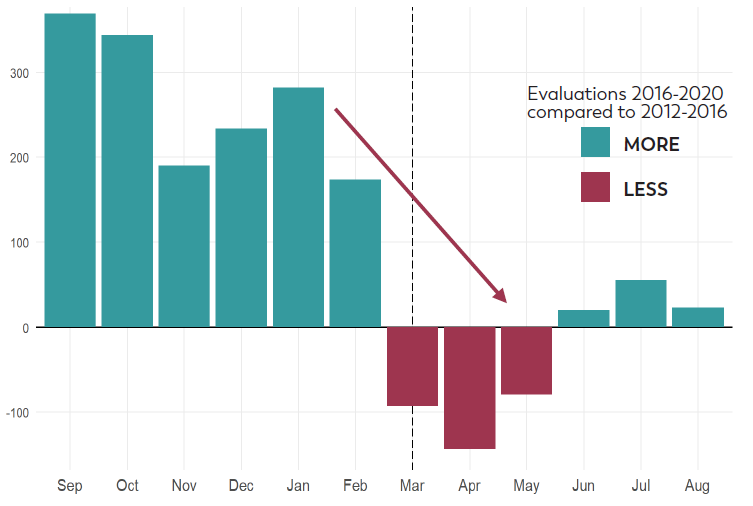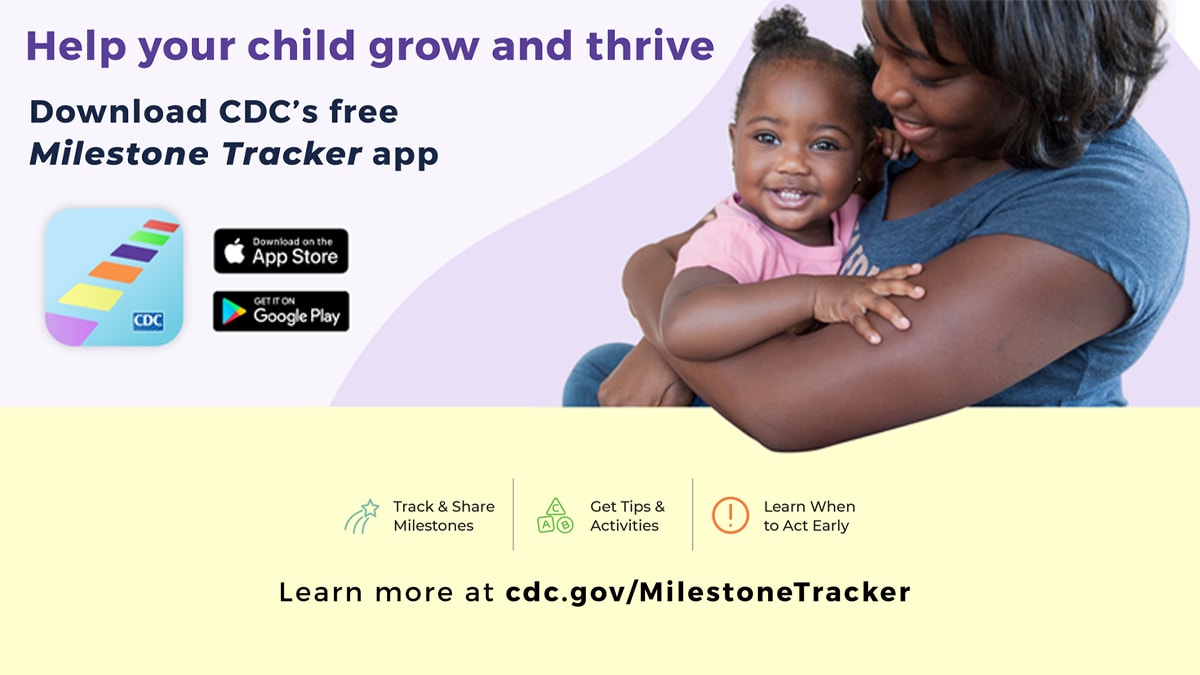What to know
Autism spectrum disorder (ASD) continues to affect many children and families. The COVID-19 pandemic brought disruptions to early ASD identification among young children. These disruptions may have long-lasting effects as a result of delays in identification and initiation of services. Findings from CDC’s Autism and Developmental Disabilities Monitoring (ADDM) Network show a need for timely and equitable access to early identification and support services.

Autism and Developmental Disabilities Monitoring (ADDM) Network
The Children's Health Act of 2000 authorized CDC to create the ADDM Network to track the number and characteristics of children with ASD and other developmental disabilities in diverse communities throughout the United States. The ADDM Network has been collecting and reporting ASD data from across the United States for more than 20 years.

Data collected by the ADDM Network in 2020 show that ASD continues to increase over previous years' numbers. About 1 in 36 8-year-old children living in ADDM Network sites were identified with ASD in 2020, based on tracking in 11 communities across the United States. This number is higher than the ADDM Network's 2018 estimates, which found that 1 in 44 8-year-old children were identified with ASD.
Early ASD identification was disrupted following the start of the COVID-19 pandemic
In 2020, children born in 2016 were 1.6 times as likely as children born in 2012 to be identified as having ASD by 48 months of age. This is important because the earlier a child is identified with ASD, the earlier they can access services and supports.

An analysis comparing the number of evaluations and ASD identifications before and after the onset of the COVID-19 pandemic found that before the pandemic, 4-year-old children were receiving more evaluations and identifications than 8-year-old children did when they were 4 years of age. However, these improvements in evaluation and ASD detection were wiped out beginning in March 2020. Delays in evaluation could have long-lasting effects as a result of delays in identification and in initiation of services during the COVID-19 pandemic.
ASD was identified at higher rates in some groups of children than in previous years
For the first time, ADDM data found that the percentage of 8-year-old Black (2.9%), Hispanic (3.2%), and Asian or Pacific Islander (3.3%) children with ASD was higher compared with 8-year-old White children (2.4%). This is the opposite of racial and ethnic differences observed in previous ADDM reports.
Also, for the first time, the percentage of 8-year-old girls identified with ASD was higher than 1%, but boys were nearly 4 times as likely as girls to be identified with ASD.
Intellectual disability can occur with ASD
Intellectual disability (ID) can affect a person's ability to learn at an expected level and function in daily life. Among 8-year-old children with ASD, more than one third (37.9%) also had ID based on findings from the ADDM Network.
Although progress has been made in the identification of ASD among children of all races and ethnicities, concerns remain around the percentage of Black children identified with ASD who also had ID (50.8% among 8-year-olds). This percentage is higher than for Hispanic (34.9%) or White (31.8%) children and remains consistent with previous reports from the ADDM Network.
Data for Action: How can the ADDM Network findings be used?
Service providers, such as healthcare organizations and school systems, researchers, and policymakers, can use ADDM Network findings to
- Support service planning
- Inform policies that promote improved outcomes in health care and education
- Guide research on risk and protective factors for ASD
- Promote interventions that can help children with ASD succeed
Early identification remains a major focus of CDC's ADDM Network, as it is one of the most important tools communities have in helping to make a difference in the lives of children with ASD. CDC will continue tracking the number and characteristics of children with ASD and working to understand factors associated with outcomes among children and adolescents with ASD as they age and transition to adulthood.
ADDM Network findings on age of diagnosis of ASD support CDC's Learn the Signs. Act Early. program, which aims to improve early identification by promoting early childhood developmental monitoring by parents, childcare providers, and healthcare providers.
Resources for parents if they suspect their child might have ASD
Parents know their children best. If a parent has concerns about their child's development, it is best to Act Early to help the child and family get the services and supports they might need.
Parents can Act Early by
- Sharing concerns with their children's healthcare provider
- Asking for developmental screening
- Getting connected to early intervention services
Early intervention (before school age) can have a significant impact on a child's ability to learn new skills and may also reduce the need for costly interventions over time.
CDC's FREE Milestone Tracker app makes it easy for parents to track, support, and discuss their child's development with their child's healthcare provider and other care and education providers. The app is available in both English and Spanish. Download it for free in the App Store and on Google Play.

Important Steps to Take if There Is a Concern
• Talk with the child's doctor and ask for developmental screening.
• Contact a local early intervention program for a free or low-cost evaluation for children under age 3 years, or a school system for a free evaluation for children age 3 years or older.
For more tips on what parents and others can do when there is a concern, visit www.cdc.gov/concerned. Parents should remember that it's never too late to get help for their child. An ASD diagnosis from a doctor is not necessary for a child to begin receiving some types of services.
More information
- ADDM Network Data Resources
- Access FREE resources for parents, health professionals, childcare providers, and educators who work with children.
- Learn more about CDC's ongoing Autism and Developmental Disabilities Monitoring (ADDM) Network.
- United States 106th Congress (1999-2000). H.R.4365 - Children's Health Act of 2000. Available at: https://www.congress.gov/bill/106th-congress/house-bill/4365. Accessed on January 19, 2024
